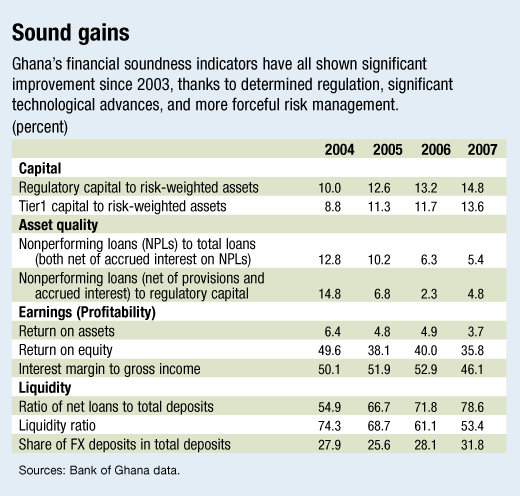
Typical street scene in Santa Ana, El Salvador. (Photo: iStock)
IMF Survey: Ghana's Reforms Transform Its Financial Sector
May 22, 2008
- Undeveloped financial markets in much of sub-Saharan Africa limit growth
- But Ghana has made gains in financial and capital market development
- Goal is financial stability via more deepening, better resource allocation
Ghana's macroeconomic stabilization has allowed it to achieve remarkable success in developing its financial sector.

Market stalls in Accra, Ghana: reduced state involvement has unleashed the financial sector (photo: Mark Horvit/Fort Worth Star-Telegram)
AFRICAN FINANCIAL REFORMS
The development has been driven by well-sequenced financial sector liberalization policies, enhanced competition (including from abroad), and gradual capital account liberalization. The success of Ghana's ambitious financial reforms can be attributed largely to solid "buy-in" from key stakeholders—especially the private sector—and coordinated donor assistance.
Despite its success in advancing financial soundness, Ghana still has much to do. It needs to deepen its secondary capital markets; reform small and medium-sized enterprise finance, microfinance, and rural banking; and increase the private-sector role in the pension and insurance systems. And it must expand its equity market and ensure careful supervision of the rapidly evolving financial system.
Reforms to date
The Ghanaian financial system has been profoundly transformed since the joint IMF-World Bank Financial Sector Assessment Program (FSAP) assessment in 2000 (and its update in 2003). The FSAP identified key elements of a medium-term financial-sector strategy reflecting the government's priorities. Some indicators of Ghana's success are the following:
• Ghana's financial sector development has had a notable impact on growth, which rose to 6.3 percent in 2007 from 4.5 percent in 2002 prior to the onset of reforms.
• The ratio of money (M2) to GDP, the traditional measure of financial deepening, doubled after 2004, reaching 43 percent of GDP by the end of 2007. Much of the increase was funded by an increase in demand and savings deposits.
• The banking system has grown rapidly, fueled by fast credit expansion. Banks now account for about 70 percent of the financial sector.
• Financial sector vulnerabilities have been reduced. Improved banking supervision now gives priority to capital adequacy, bank risk management, and more on-site supervision.
• The government has passed most of the bills recommended by the 2003 FSAP to improve both prudential supervision and the legal basis for financial intermediation.
Donor assistance
Ghana's financial sector development has been guided by the government's Financial Sector Strategic Plan. The plan spells out policy and legislative reforms to deepen the financial sector and build capital markets while keeping the economy stable. It also aims to increase outreach and access to financial services.
The reforms have benefited from ownership by government and key stakeholders, including the private sector. Coordinated donor assistance has been vital to the institutional development and training programs that are so important to Ghana's strategy.
Reduced direct involvement of the state has unleashed the dynamism of the financial sector. The government expects to complete selling its shares in private financial institutions by the end of 2008. In the pension area, Ghana's facilitation of private schemes is vital to building its domestic capital market. The state's role is thus shifting toward oversight to ensure the integrity of the financial system.
Financial stability, soundness
Although the Ghanaian financial system incorporates a broad range of institutions, the banking system dominates. In 2007, the ratio of total banking system assets to GDP was 72.4 percent. The banking system is concentrated, however, with the three largest banks accounting for 41 percent of banking sector assets.
Financial sector stability is a priority and Ghana's financial soundness indicators have all improved in recent years (see table). Indeed, despite the banking system's rapid growth—led by credit expansion—the system is becoming increasingly sound, thanks to determined regulation, significant technological advances in the sector, and more forceful risk management by banks.

At the same time, more aggressive lending has not impaired the capital adequacy of the banking system. In fact, the capital adequacy ratio reached 14.8 percent in 2007 from 9.5 percent in 2003.
The quality of financial assets has also improved substantially, with the share of nonperforming loans in the aggregate bank credit portfolio falling to 5.4 percent in 2007 from 14.7 percent in 2003. This was attributable to better loan recovery and rapid credit growth; to date most of the new loans are performing.
Ghana's financial reforms have increased the banking system's resilience to potential financial shocks. Moreover, the central bank is carefully monitoring the system's financial stability; it publishes a periodic financial stability report that is discussed by the central bank's monetary policy committee.
Developing financial, capital markets
Ghana's introduction of a partial capital account liberalization in 2006 (the Foreign Exchange Act) was a watershed development. It opened up the longer end of the market to nonresident investors and has helped accelerate development of Ghana's domestic (particularly bond) capital markets.
But the secondary government bond market remains illiquid, as most such bonds that are not held by the central bank are bought by banks. In this connection, one priority is to broaden the local private investor base beyond the Social Security and National Insurance Trust and the State Insurance Corporation.
Although the Ghana Stock Exchange (GSE) has been a source of financing for corporations, it remains small and illiquid. Trading is discontinuous, the total value traded is less than 1 percent of GDP, and turnover is below 4 percent. Now that regulatory reform of the GSE has been completed, the government's priority is to expand the investor base through public education and fiscal incentives for mutual and private pension funds.
Next steps
Despite its recent achievements, the financial-sector reform agenda remains incomplete. Most important, the government must deepen secondary capital markets and reform small and medium-sized enterprise finance, microfinance, and rural banking, and the pension and insurance systems.
The authorities must also address cost inefficiencies, which are keeping interest rate spreads too high. And they must continuously adapt supervision to keep the financial sector stable in the context of rapid financial deepening and the emergence of new financial instruments. The planned update of the government's Financial Sector Strategic Plan will address these priorities.
While Ghana's banking system has grown rapidly, it serves only about 10 percent of the bankable population. The central bank, in collaboration with commercial banks, is therefore spearheading the introduction of a National Payments System—to be in place by June 2008—to ensure the delivery of financial services to all segments of the population.
Firmer regulation
Firmer regulation of nonbank financial institutions is a medium-term goal. For this purpose the Bank of Ghana has drafted a bill that deals with such things as licensing, capital, liquidity, and other requirements; ownership and corporate governance; accounts and financial statements; powers of supervision and control; and receivership and liquidation.
The nonbank bill is a key element of the central bank's effort to bolster regulation and supervision to meet the challenges of a dynamic and fast-changing financial sector.
Finally, Ghana's effort to implement its medium-term financial sector strategy will benefit from the support of the IMF, World Bank, and other development partners.
Mahamadu Bawumia is Deputy Governor of the Bank of Ghana and Theresa Owusu-Danso is an economist at the Bank. Arnold McIntyre is the IMF Resident Representative in Ghana.
Comments on this article should be sent to imfsurvey@imf.org


